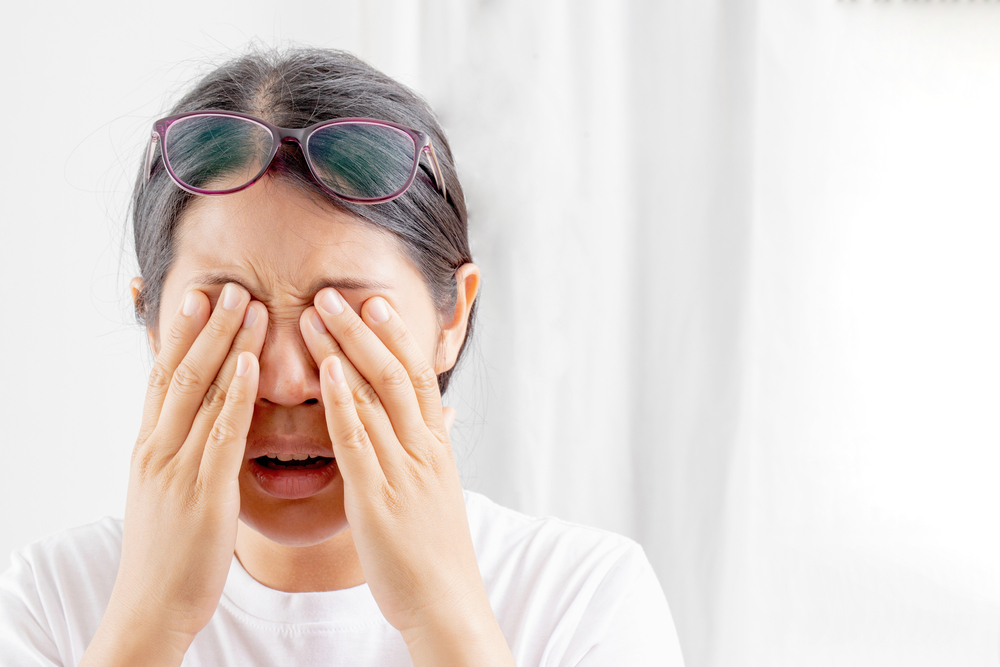
Dry eye syndrome can present as a variety of uncomfortable symptoms, such as redness, stinging, or a gritty sensation in the eyes. This condition can be temporary or ongoing, caused by a lack of tear production or rapid evaporation of tears. If unattended, it may result in issues like infections or double vision.
However, relief is attainable through home remedies, over-the-counter or prescription eye drops, and identifying and managing underlying causes. Understanding the condition's root causes is crucial in finding the right treatment and preventing future occurrences.
What Causes Dry Eye Symptoms?
Millions of people around the world experience dry eye symptoms. Unlike chronic dry eye, which can result from various underlying conditions, temporary dry eye can stem from environmental factors like wind or air conditioning. You may experience symptoms due to the following factors:
Age-related Decline in Tear Production
Your ability to produce tears naturally decreases with age, which can cause dryness and irritation. People over 50 are more likely to experience symptoms of this type of dry eye.
Medication Side Effects
Some medications lower mucus production in the eyes, worsening dry eye symptoms. Antihistamines, antidepressants, diuretics, and beta-blockers used to treat hypertension are examples.
Prolonged Computer Use
Prolonged computer use can cause symptoms of dry eyes due to decreased blinking. Since you blink less frequently when concentrating on a computer screen, your tears dry up faster.
Hormonal Imbalances
Hormones influence tear production. Hormonal imbalances due to pregnancy, menopause, or taking birth control pills may lead to symptoms of dry eyes.
Vitamin A Deficiency
A deficiency in this essential nutrient can cause dry eye symptoms and other vision problems like night blindness. Dryness and irritation of the eyes can result from a diet lacking vitamin A.
Autoimmune Disorders
Sjögren's syndrome is an autoimmune condition affecting salivary and tear glands. Other autoimmune disorders like diabetes, lupus, and arthritis can result in inadequate or poor tear production, causing dry eye symptoms.
Allergies
Allergies can trigger chronic dry eye symptoms. You might experience scratchy, red, and watery eyes. An oral antihistamine can treat your allergy, but these drugs can worsen dry eye symptoms. It is best to consult your doctor about the appropriate allergy medication for you.
Dehydration
Dry eyes can occasionally stem from dehydration or a lack of fluid intake. Dark urine, a lack of energy, feeling faint, a rapid heartbeat, and difficulty urinating are some additional signs of dehydration. Drinking more water and increasing fluid intake can help with mild dehydration and chronic dry eye.
Smoke
Smoking or being around smoke can dry out your eyes. Avoid being around smoke, and if you smoke, try to quit. Try nicotine replacement therapy or ask your doctor about a prescription drug to reduce cravings.
Using Contact Lenses
Another risk factor for chronic dry eye is long-term contact lens wear. That is due to some lenses blocking the cornea's access to oxygen.
Conclusion
It is best to consult your eye doctor if you have dry eye symptoms. He/she will identify the underlying cause and create a customized treatment plan. Besides addressing any underlying medical conditions, your doctor will recommend the appropriate treatment. That may include home remedies, over-the-counter medication, or prescription eye drops.
For more on causes of dry eye syndrome, visit Enochs Eye Care, Clarity Vision in Suffolk, VA. Please call (757) 638-2015 to schedule an eye exam today.
















